Black Friday Briefing – September 12, 2025, UPDATED 2:30 PM
Suspect Arrested in Charlie Kirk Murder; Key Details Emerge (Sept. 12)
Authorities say a 22-year-old Utah man, Tyler Robinson, has been arrested in connection with the sniper killing of conservative activist Charlie Kirk at Utah Valley University.
Robinson is charged with aggravated murder, firearm discharge causing serious injury, and obstruction of justice. According to Gov. Spencer Cox, Robinson allegedly confessed or implied his involvement to a family member, which led to the arrest.
Evidence recovered includes a bolt-action rifle found in a wooded area near the campus, as well as bullet casings bearing messages such as “Hey fascist! Catch!”, “Bella Ciao”, and other inflammatory inscriptions. Investigators believe Robinson acted alone.
President Donald Trump and state officials have praised the swift work of law enforcement. Meanwhile, Utah Governor Spencer Cox has called for national reflection amid concerns over rising political violence.
HBCUs Locked Down After ‘Fight Back’ Threats (Sept. 11): Four historically Black colleges were forced into emergency lockdowns after receiving terroristic threats following Charlie Kirk’s assassination. Alabama State, Hampton, Virginia State, and Clark Atlanta canceled classes and sheltered students in place amid calls by white supremacists to “fight back.” No violence occurred, but campus officials heightened security and noted the irony that Black schools were targeted despite having no link to the Utah shooting. The threats disrupted thousands and underscored rising racial tensions stoked by extremists.
Black Radio Host Blasts Caller’s Kirk Conspiracy (Sept. 11): On SiriusXM, guest Reecie Colbert erupted at a caller who tried to blame Black women like Michelle Obama and Maxine Waters for Charlie Kirk’s murder. Colbert noted the killing happened “in white-ass Utah” and told the caller, “Do not bring Black women in on this – we ain’t got nothing to do with it.” The heated on-air exchange (scroll to time stamp 4:45) went viral as Colbert demanded an end to scapegoating, reflecting broad anger at baseless attempts to pin a white-on-white crime on Black activists. Her rebuttal became a rallying cry against racist disinformation.
BLM Rejects Retaliation After Kirk Killing (Sept. 11): Black Lives Matter’s national leadership urged calm and unity in the wake of Charlie Kirk’s assassination, pushing back against those calling for vengeance. In a public statement, BLM condemned all political violence and vowed “we refuse to repeat this cycle” of blame and reprisal. The organization – often demonized by Kirk – stressed that vigilante justice has no place in a just society. Their stance provided a voice of reason as partisan commentators traded accusations, emphasizing humanity over score-settling.
Fed Independence at Stake as Trump Targets Lisa Cook (Sept. 10): A federal judge blocked President Trump’s attempt to fire Federal Reserve Governor Lisa Cook, the central bank’s only Black woman member. Cook is fighting allegations of pre-Fed mortgage irregularities that the White House used to claim “cause” for removal. Analysts warn that losing Cook could undermine the Fed’s quorum and tilt policies away from inclusive growth. The showdown has raised alarms about political interference and its impact on Black borrowers and HBCU endowments.
S.C. Shooting Exposes Hate-Crime Law Gap (Sept. 8): A Black South Carolina man’s ordeal is reigniting pressure on lawmakers to finally pass a hate-crime law. Jarvis McKenzie was shot at and called “boy” by a white assailant while waiting for work, but South Carolina is one of only two states with no hate-crime statute. Local officials charged the shooter under a weak county ordinance carrying at most 30 days in jail. McKenzie joined advocates at a news conference, asking why his state still refuses tougher penalties for racist violence. The case has energized a decade-long push to stop giving bigots a free pass.
NAACP Sues Mississippi Over Jackson Water Funds (Sept. 8): The NAACP filed a federal complaint accusing Mississippi officials of discriminating against majority-Black Jackson in allocating infrastructure money. The suit contends the state withheld or delayed millions in federal water crisis funds that should have gone to fix Jackson’s failing pipes. It alleges a pattern of “intolerable” neglect and disparate treatment, as predominantly white areas received swift support. State leaders deny wrongdoing, but Jackson’s leaders say the capital’s ongoing water woes – after repeated system collapses – prove their point about race-based disinvestment.
Court Orders N.C. to Purge Voter Rolls, Alarming Advocates (Sept. 9): A federal judge approved a consent order forcing North Carolina to remove outdated or ineligible voters from its rolls after the DOJ sued for violations of election law. Republican state officials hailed the order as ensuring integrity, but civil rights groups are on edge. They note past “purges” have wrongly dropped Black voters and those who miss mailers or skip elections. The state says it will carefully follow the law in scrubbing the rolls. Voting-rights monitors are mobilizing to make sure legitimate Black voters don’t get unlawfully disenfranchised ahead of upcoming elections.
Civil Rights Report Warns of ‘Project 2025’ Rollbacks (Sept. 8): Legal experts are sounding the alarm about a right-wing policy blueprint called Project 2025, which the NAACP Legal Defense Fund says would “upend” hard-won Black rights. In a new analysis, LDF details how the plan – endorsed by several GOP candidates – would dismantle federal diversity and equity programs, gut civil rights enforcement, and reverse 60 years of progress. The report offers a stark forecast: if implemented, housing, education and voting protections for Black Americans could be rolled back within months. Advocacy groups are using the findings to rally voters, arguing that the 2025 agenda represents an extremist threat to Black communities.
Black Mayors Decry Trump’s Police Takeovers (Sept. 9): Black city leaders are pushing back after President Trump moved to strip local control from Washington, D.C.’s police and threatened to do the same in other Black-led cities. In a public letter, several mayors blasted the intervention as a “power grab” rooted in racial politics. They note D.C. has cut homicides by over 30% this year with community-based programs – progress ignored in Trump’s portrayal of “horribly run” urban areas. The mayors warn that deploying federal forces and curfews in predominantly Black cities undermines democracy and public trust. They are calling on Congress and courts to help block any further takeovers of municipal police powers.
EPA Grant Cuts Leave Communities Hanging (Sept. 10): Environmental justice advocates are scrambling after a federal judge dismissed a lawsuit over the abrupt termination of EPA block grants for community cleanup. The Trump administration had axed $200+ million in “environmental justice” projects, citing new anti-DEI directives. A coalition of Black community groups and cities sued to restore the funding, which was slated for clean air and water initiatives in neighborhoods plagued by pollution. With the case tossed on technical grounds, those communities now have no federal help to address toxic sites. Organizers vow to press Congress and highlight that pulling these grants harms public health in Black areas still suffering from environmental racism.
‘Cancer Alley’ Residents Win Appeal in Petrochemical Suit (Sept. 8): A federal appeals court breathed new life into a landmark lawsuit by Black residents of Louisiana’s “Cancer Alley” who accuse parish officials of environmental racism. The plaintiffs argue local authorities approved dozens of petrochemical plants that blanketed Black neighborhoods with toxic air, causing cancer rates to skyrocket. A lower court had dismissed their case, but the 5th Circuit reversed that decision, allowing the suit to proceed. Activists in St. John the Baptist Parish celebrated the ruling as a rare victory. They say it validates the community’s fight for accountability after decades of being treated as a dumping ground.
Haitian Communities Rally as TPS Ax Hangs Over Families (Sept. 10): Haitian American leaders held solidarity rallies in New York and Miami ahead of the looming end of Temporary Protected Status for Haiti. The Trump administration had moved to terminate TPS for over 500,000 Haitians as of Sept. 2, but a court temporarily extended it to February. At Brooklyn’s Little Haiti, faith and elected leaders demanded a longer reprieve, noting that many TPS holders have U.S.-born children and deep roots in their cities. Speakers slammed the “cruelty” of forcing families back to crisis-hit Haiti and urged Congress to provide a path to residency. The uncertainty has left Haitian communities on edge, mobilizing local resources to prepare for possible mass deportations.
NYC Council Overrides Mayor to Boost Worker Pay (Sept. 10): The New York City Council voted to overturn Mayor Eric Adams’ vetoes and enact laws protecting vulnerable workers – many of them Black and Latino. One new law guarantees a minimum wage and bathroom access for app-based grocery delivery workers, who until now earned as little as $5 an hour. Another law slashes excessive fines and the threat of jail for street vendors, ending a policy that saw nearly 80% of criminal vending tickets go to Black and brown New Yorkers. Council leaders accused the mayor of “abandoning working people” by aligning with Trump-style rollbacks. By mustering a two-thirds vote to override, they advanced pay equity and kept immigrant and minority entrepreneurs out of the criminal system.
Indiana Halts Minority Contracting Program (Sept. 11): Indiana’s governor has put a longstanding minority business enterprise program on pause, raising fears of backsliding on equity in state contracts. The administration of Gov. Mike Braun requested a legal opinion on whether Indiana’s goals for minority- and women-owned business participation violate recent Supreme Court rulings and federal directives against “preferencing.” In the meantime, the state abruptly canceled its annual diversity business expo and postponed the Minority Business Commission’s meetings. Advocates for Black contractors are alarmed – they say the program helped break up old boy networks and that scrapping it will shut out qualified Black businesses. The governor’s office claims it’s following the law, but minority entrepreneurs call it a thinly veiled return to exclusion.
Ohio Backs Black Entrepreneurs with $1.2M Infusion (Sept. 10): The state of Ohio approved more than $1.2 million in new support for minority-owned small businesses. At its monthly meeting, the Minority Development Financing Advisory Board green-lit low-interest loans and grants to a dozen companies led by Black and brown entrepreneurs. The funds will help launch projects from a manufacturing startup in Cleveland to a community grocery in a Cincinnati food desert. State officials noted that minority businesses often lack access to traditional capital, and hailed the move as both morally right and economically smart. Local Black business associations welcomed the investment, saying it will create jobs and help close the wealth gap.
Detroit Program Revives Vacant Stores for Local Businesses (Sept. 11): Detroit is turning “gray” vacant storefronts into opportunity through a novel incentive program. City officials this week showcased the “Gray Box Initiative,” which retrofits long-abandoned shop spaces with basic plumbing, electrical and HVAC – essentially a blank slate ready for a new tenant. By covering these upfront costs, Detroit dramatically lowers the barrier for small entrepreneurs (often Black) to open up in historically disinvested neighborhoods. Several refurbished spaces are already under lease to local barbers, bakers and boutiques. Officials say filling empty buildings with homegrown businesses will boost neighborhood pride and economic activity after years of blight.
New Homes Rise in Historic Black Indy Neighborhood (Sept. 11): In Indianapolis, a community nonprofit broke ground on a 36-unit affordable housing project in Martindale-Brightwood – a once-redlined Black neighborhood fighting revitalization. The Edna Martin Christian Center led a celebratory ceremony on the long-vacant lot where new townhomes and apartments will be built for low-income families. Black residents and clergy applauded the development, which will include pathways to homeownership in an area where predatory investors have often priced people out. City leaders called it a model of “development without displacement.” For elders who saw Brightwood decline from decades of highway construction and neglect, the construction crews on site represent hope that the community can rebuild and keep its legacy.
Family Pleads for Missing Milwaukee Woman’s Safe Return (Sept. 9): Milwaukee police are searching for 48-year-old Tyeshia Quinn, who disappeared under unsettling circumstances last month. Quinn, a Black mother of two, was last heard from on Aug. 20; her family reported her missing on Sept. 9. She is 5’4” with a short black afro, and relatives say it’s unlike her to lose contact. Authorities have canvassed the area where she was last seen (45th and Center Street) and are asking anyone with information to call the Milwaukee Police Department at 414-935-7262. Quinn’s loved ones have plastered flyers across the city and held prayer vigils, anxious to counter what they call a sluggish response. They fear her case isn’t drawing enough attention and urge the community to stay vigilant until Tyeshia is found.
Illinois Supreme Court Picks Second Black Chief Justice (Sept. 9): Justice P. Scott Neville Jr. has been elected by his peers as the next chief justice of the Illinois Supreme Court, making him only the second African American to hold the role. A Chicago native and longtime civil rights attorney, Neville will lead the state’s highest court for a three-year term starting in October. Colleagues say he brings a deep commitment to equal justice – as a younger lawyer, Neville fought employment discrimination cases and helped expand Black political representation through redistricting lawsuits. Community leaders in Illinois hailed his elevation, noting that representation at the top of the judicial branch can inspire public confidence. Neville himself called it “the honor of a lifetime” and pledged to improve access to the courts for all citizens.
Chicago Launches Black Student Success Committee (Sept. 8): Chicago Public Schools is moving forward with an ambitious plan to boost outcomes for its Black students – even as federal officials target such equity efforts. The city’s Board of Education voted to form a Black Student Success Committee
and appointed veteran educator and activist Jitu Brown as its chair. The committee will oversee implementation of CPS’s new Black student success plan, which aims to hire and retain more Black teachers, cut suspension rates, and expand culturally relevant curriculum. Notably, this comes as the Trump administration threatens districts that “single out” racial groups for support. Chicago’s school board is not backing down; members said the data demands focused solutions because Black students have lagged for too long. “We’re going to do right by our kids,” one board member declared, “regardless of the political winds.”
N.C. A&T Becomes First HBCU to Top 15,000 Students (Sept. 11): North Carolina A&T State University announced a record-breaking fall enrollment of 15,275 students, making it the first historically Black college to ever exceed 15,000. The Greensboro campus has grown 6.7% since last year, hitting its 12th straight year of enrollment increases. Officials credit booming interest in A&T’s STEM and business programs – graduate enrollment alone jumped 11% – as well as aggressive recruitment and new facilities. The university, already the nation’s largest HBCU, says the milestone proves that investment in Black higher education yields results. Alumni cheered the news on social media, noting how far A&T has come from its modest origins in 1891. The growth is also an economic engine for the region. As one school leader put it, “This shows HBCUs are more relevant than ever.”
Florida’s First HBCU Sees Record Enrollment Jump (Sept. 8): Edward Waters University in Jacksonville is celebrating a 30% surge in enrollment – a modern record for the 157-year-old institution. This fall EWU has 1,210 students registered, up from around 930 last year. The once-struggling private HBCU attributes the spike to new online programs, aggressive recruiting in urban and rural communities, and renewed trust after earning accreditation stability. University president Dr. A. Zachary Faison said the dramatic growth is proof “you don’t have to be a big state school for students to see your value.” The freshman class is one of the largest in decades, filling dorms to capacity. Faculty and staff have risen to the challenge of the influx, and local churches and alumni pitched in with donations for extra scholarships. In a state where Black education has often been under threat, EWU’s rebound is a bright spot empowering the next generation.
Morgan State Gets Grant Toward New Medical School (Sept. 5): Morgan State University secured a $1.75 million grant from the Robert Wood Johnson Foundation to advance its plans for a new College of Osteopathic Medicine. The Baltimore HBCU has been laying groundwork to open the first new medical school at a historically Black institution in nearly half a century. The grant will fund a two-year planning phase – focusing on curriculum, accreditation and partnerships – aimed at welcoming the first class by 2027. Morgan State’s president called the investment “transformative,” noting the stark underrepresentation of Black doctors. The planned medical school (a collaboration with Ascension Saint Agnes Hospital) will prioritize training physicians to serve urban and rural underserved communities. Maryland officials praised the move, saying more homegrown doctors of color will improve health outcomes and equity statewide.
Martin University President to Step Down (Sept. 11): In Indianapolis, Martin University’s president Dr. Sean L. Huddleston announced he will resign at the end of the semester after six years at the helm. Martin is Indiana’s only predominantly Black institution of higher education, and Huddleston is credited with stabilizing its finances and expanding workforce training programs during his tenure. He did not publicly cite a reason for his departure, simply stating that it’s time to “pass the torch” and that he’s proud of the school’s progress. Under Huddleston, Martin’s enrollment grew modestly and community partnerships flourished – including adult education initiatives for the surrounding Black neighborhood. The board of trustees plans a national search for the next president. Students and faculty thanked Huddleston for his service at a campus forum, reflecting on how Martin University has increased its profile and impact in the city’s minority communities over the past few years.
Baltimore Mayor Scolds Reporter’s ‘Crips’ Remark (Sept. 8): Tensions flared at a Baltimore City Hall press conference when a local TV reporter implied a Black staffer’s blue attire signaled gang affiliation. Mayor Brandon Scott abruptly interrupted the line of questioning after the reporter asked if an aide wearing a blue cap was “associated with the Crips.” An irate Scott called the question racist and “absolutely unacceptable,” noting the staffer is a respected public servant. He later said it was “insane” that a Black man can’t wear blue without someone stereotyping him as a gang member. The exchange, captured on video, spread online as viewers commended the mayor for defending his team. Media colleagues distanced themselves from the reporter’s insinuation. Community members say the incident shows why diverse representation in newsrooms matters to avoid the type of biased assumptions that Black Baltimoreans know too well.
Yankees’ Tribute to Charlie Kirk Sparks Backlash (Sept. 11): The New York Yankees held a pre-game moment of silence for slain commentator Charlie Kirk, drawing mixed reactions from fans and players. While some in the stadium bowed heads out of respect, many expressed outrage that a major league team honored a figure known for inflammatory rhetoric about Black and LGBTQ+ people. Social media erupted once the tribute became known, with critics calling it “disgraceful” and noting that leagues never memorialize victims of police brutality in the same manner. The Yankees organization said it was acknowledging a public figure’s tragic death, but internal sources report discomfort even among some staff. The incident has fueled debate about sports teams wading into political waters – and whom they deem worthy of tribute. For Black fans and players, the gesture felt like a slap, highlighting a cultural gap in the way different lives and deaths are valued.
‘Festival of Joy’ Celebrates Black Resilience (Sept. 13): In Indianapolis, a community festival dedicated to Black culture and happiness is making a comeback. After a pandemic pause, BLACK: A Festival of Joy returns to Taggart Memorial Amphitheater this weekend, showcasing Afro-centric art, music, and food. Organizers intentionally created the festival as an oasis of positivity “for us, by us,” emphasizing joy as an act of resistance in difficult times. Families will enjoy everything from drumming and spoken word performances to health and wellness workshops. The event’s revival comes as the city’s Black residents continue to grapple with gun violence and economic inequities. “We carry a lot of trauma,” said one organizer, “so carving out space to celebrate ourselves is healing.” Attendees say seeing thousands of Black folks revel in fellowship – dancing, laughing, learning – is a powerful reminder of their community’s enduring spirit.
Black Family Opens Bookstore to Empower Youth (Sept. 11): What began as a family homeschooling blog has blossomed into a new brick-and-mortar bookstore and learning center in Indianapolis. The Meeks family this week opened Black WorldSchoolers Bookstore, stocked entirely with books by Black authors and educational materials centering Black history and culture. The couple, Alexis and Jason Meeks, started by sharing resources online for other parents of color seeking culturally relevant curriculum. Demand grew, and now their physical store provides not just books but a safe space for Black youth to read, explore and engage in workshops. Community members packed the soft launch, many moved to see children finding characters that look like them on the shelves. The Meeks say their mission is to combat the lack of representation in traditional education. Local teachers have already partnered with the store for field trips. The project shows how a family’s passion for learning can spark a broader movement to uplift and inspire Black students.
Landmark Conviction in Murder of Black Trans Woman (Sept. 10): LGBTQ+ advocates are spotlighting a historic federal hate-crime verdict as violence against Black transgender women continues unabated. Earlier this year, a South Carolina jury found a man guilty of murdering Denali “Dime” Doe, a 24-year-old Black trans woman – marking the nation’s first hate-crime conviction for a killing motivated by gender identity. This week, supporters held a vigil for Doe and others like her, noting the convicted killer still awaits sentencing. They lauded the Justice Department for securing justice in Doe’s case but stressed that Black trans women remain extremely vulnerable. At least a dozen have been killed nationwide so far this year. Activists are urging more proactive protection and culturally competent policing, saying “one conviction is not enough” when an entire community lives in fear simply for being who they are.
Poll: Skepticism of Corporate DEI Rising Among Black Americans (Sept. 9): A new poll finds only about one-third of Black Americans now believe corporate diversity, equity and inclusion programs are “very effective,” a sharp drop from just a few years ago. The survey, conducted by a coalition of civil rights organizations, suggests growing frustration that DEI efforts haven’t delivered concrete improvements on racial pay gaps or advancement. Interviews reveal some view corporate DEI as mere window dressing – committees and trainings that don’t translate into Black promotions or investment in Black communities. The decline in confidence also comes amid fierce political attacks on DEI, which may be sowing doubt about the legitimacy of these initiatives. With right-wing agendas openly pushing to eliminate DEI roles (“wasteful,” they claim), experts say companies must demonstrate real outcomes if they want to maintain support. Otherwise, Black employees and consumers will increasingly see through slogans and demand accountability instead of empty rhetoric.
Study: Redlined Neighborhoods Still Bear Health Scars (Sept. 8): A new public health study underscores how the legacy of redlining – the mid-century practice of denying loans in Black areas – continues to damage Black Americans’ health today. Researchers found historically redlined neighborhoods suffer significantly higher levels of air pollution and heat island effects, leading to elevated rates of asthma, heart disease, and pregnancy complications. Notably, these disparities persisted even when controlling for income, pointing to environmental conditions baked into neighborhood infrastructure. For example, formerly redlined zones often have fewer trees and more industry, spiking residents’ exposure to toxins and extreme heat. The study out of UC Berkeley bolsters activists’ calls for “environmental reparations” – targeted investment to undo racist land-use decisions. Policymakers in cities like Chicago and Richmond are citing such data to direct climate resilience funds to the Black communities that need it most.
USDA Rolls Out $2B in Relief for Black Farmers (Sept. 12): The U.S. Agriculture Department reports it has paid out nearly all funds from a $2.2 billion program to compensate farmers of color for past discrimination. Over 23,000 Black farmers and other farmers of color nationwide have received checks of up to $500,000 through the program, which was authorized by Congress in 2022 after the courts struck down earlier debt-relief efforts. USDA leaders say the payments won’t make up for decades of denied loans and foreclosures that decimated Black farm ownership, but represent a “meaningful step” toward righting those wrongs. Many recipients are using the money to buy equipment, catch up on bills, or invest in land – crucial lifelines to keep their operations afloat. Black farm advocates acknowledged the progress yet continue to push for structural reforms at USDA. They argue that empowering a new generation of Black farmers will require stronger civil rights enforcement so that future loans are granted fairly and not mired in the biases of the past.
Manhunt for Kirk’s Killer Intensifies, Speculation Swirls (Sept. 12): Federal and local authorities are still hunting the sniper who killed Charlie Kirk during a Utah campus event, as conspiracy theories about the shooter’s identity run rampant. The FBI released grainy images of a masked “person of interest” seen fleeing onto a rooftop but have not announced any suspects or motive. That void of information has been filled by partisan rumor – from baseless claims of Antifa involvement to others pinning blame on white supremacists. Law enforcement officials cautioned the public against online misinformation and emphasized the meticulous work underway: over 500 tips vetted, ballistics and digital evidence in analysis, and coordination with agencies nationwide. Meanwhile, security has been tightened at political gatherings across multiple states. Investigators privately acknowledge the pressure to deliver an arrest soon. In the absence of answers, fringe narratives continue to thrive, threatening to deepen divides in an already polarized atmosphere.
Judge Upholds Texas School’s Ban on Dreadlocks (Sept. 8): A Texas judge ruled that a Houston-area high school did not violate the state’s CROWN Act by suspending a Black student over his dreadlocks – exposing a loophole in the hair discrimination law. Seventeen-year-old Darryl George was punished with weeks of in-school suspension and threatened with alternative school unless he cut his locs, which officials claimed were too long under the dress code. George’s family argued the policy was exactly the kind of race-based hair bias the CROWN Act (passed last year) was meant to stop. But the judge pointed out the law bars discrimination based on hair texture or protective style, and the district insisted it was disciplining length, not style. Civil rights attorneys blasted the decision, noting George’s locs were tied up neatly, and say it guts the spirit of the law through semantics. The family is appealing as Darryl’s education continues to be disrupted – he’s now been out of regular classes for over a month simply because of his hairstyle.
Artemis II Crew Inspires Next Generation in Black Communities (Sept. 12): NASA’s history-making Artemis II crew has been on a nationwide outreach blitz, and their diversity is a major talking point as they prepare to circle the Moon next year. The crew’s pilot, Navy Capt. Victor Glover, will be the first Black astronaut to fly beyond low Earth orbit. This week Glover and his fellow astronauts spoke to thousands of students via live chats and school visits, emphasizing that “no dream is out of reach.” In a Baltimore STEM forum, Glover shared how representation matters: “I never saw a face like mine in a spacesuit as a kid, but I want today’s kids to see one and know they belong.” Educators in Atlanta and Detroit tuned in as well, integrating Artemis excitement into class projects. With the Moon mission on the horizon, Black science and tech professionals say interest in aerospace careers among minority youth is surging. The crew’s public engagement is galvanizing a new wave of Black talent to literally aim for the stars.
Help keep this vital work going and remain an independent media voice:



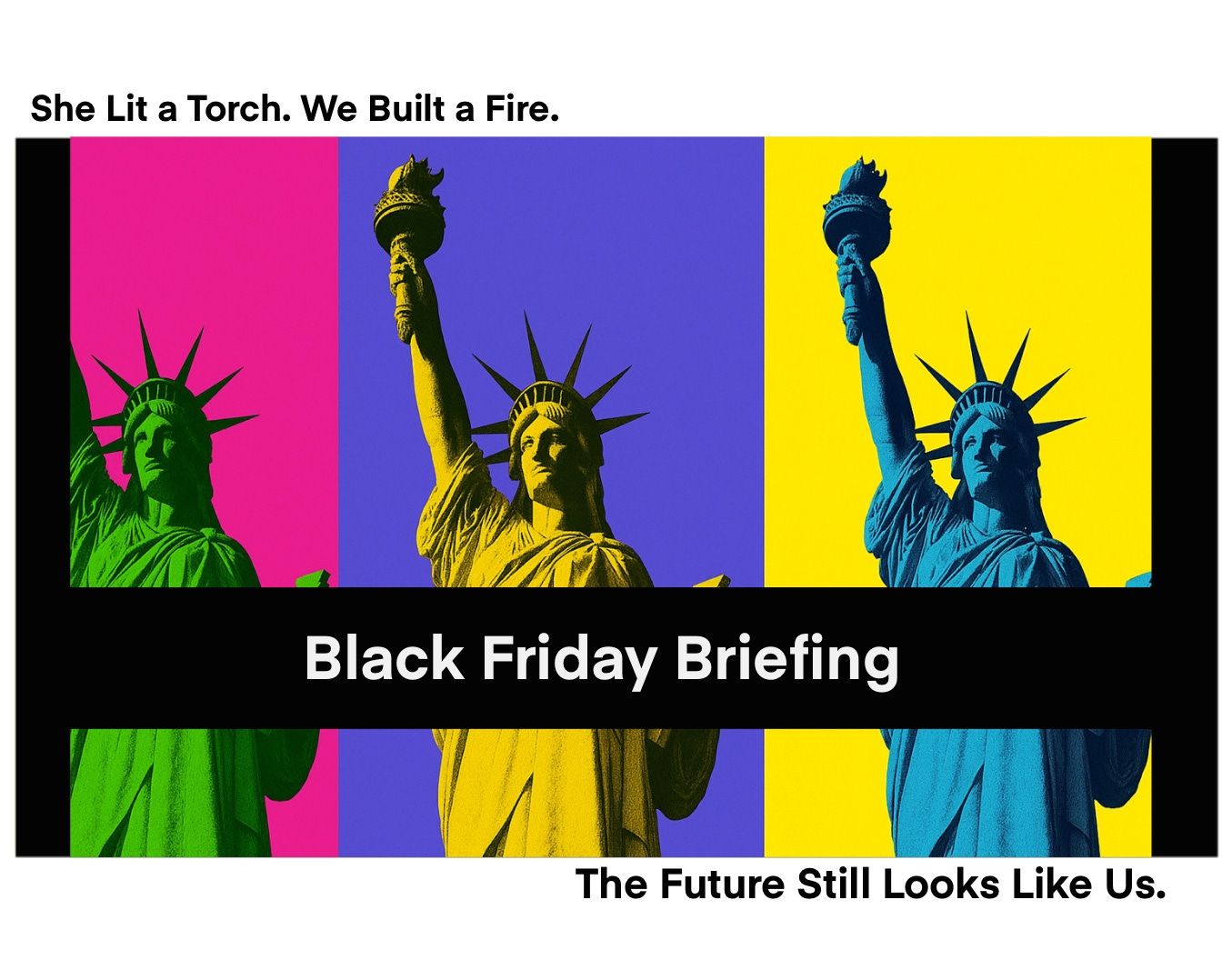

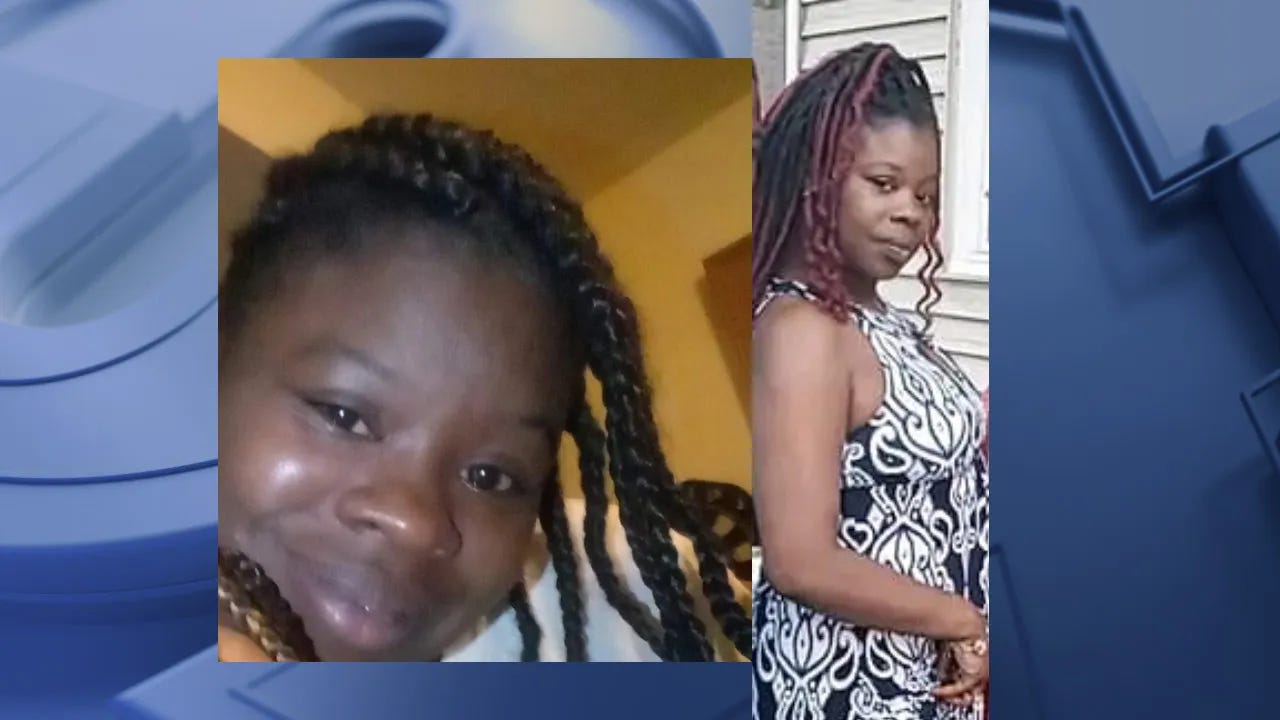


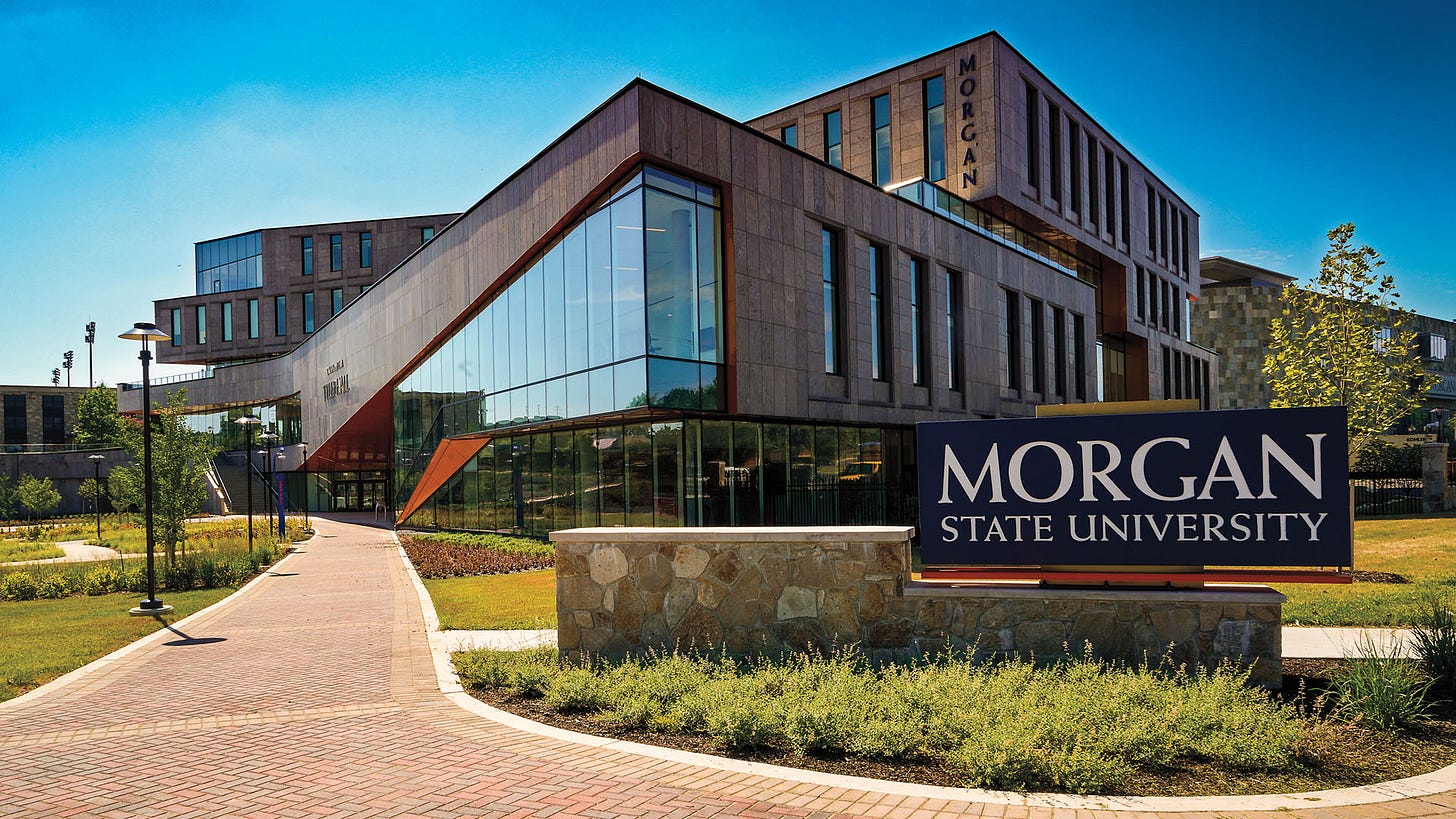
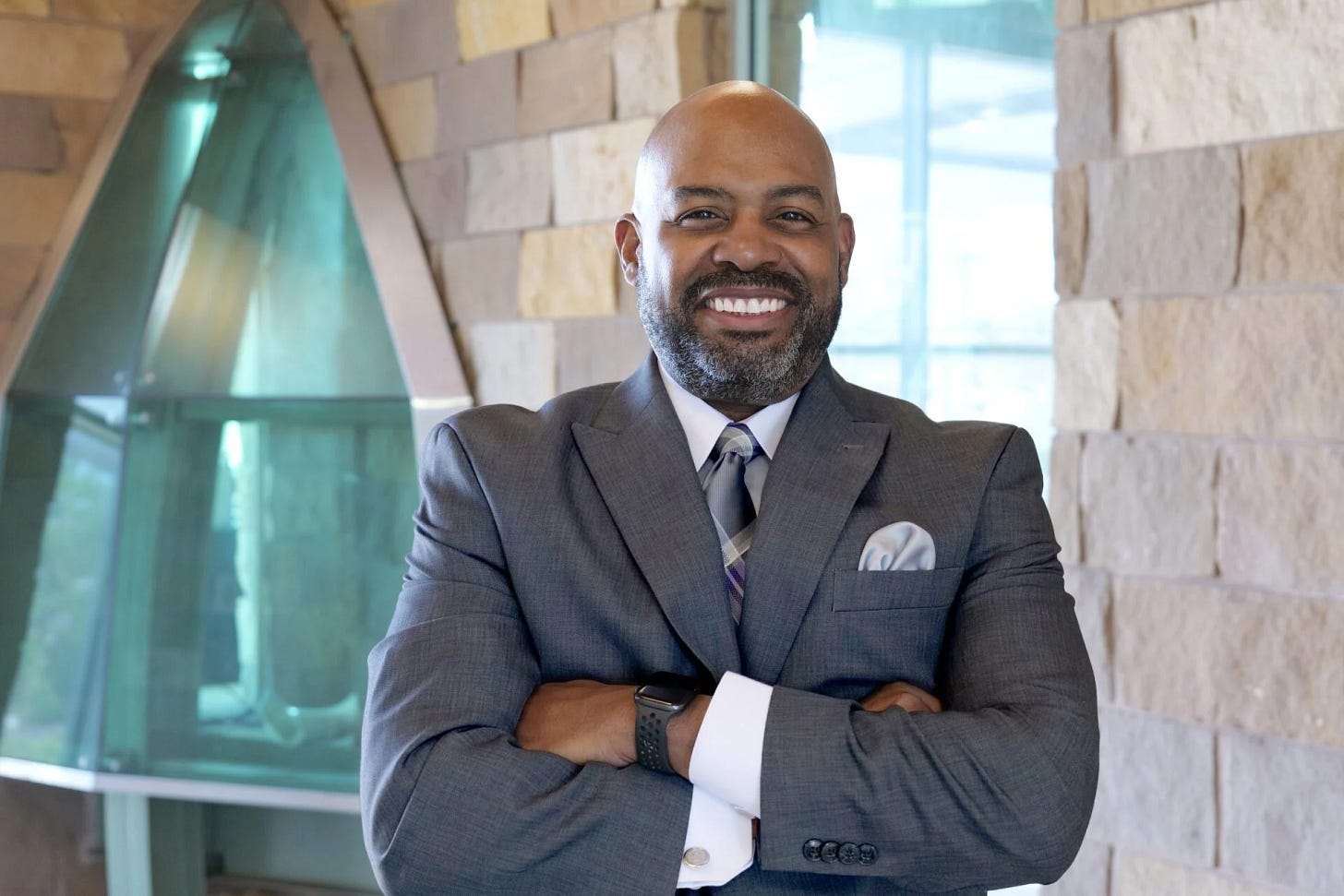
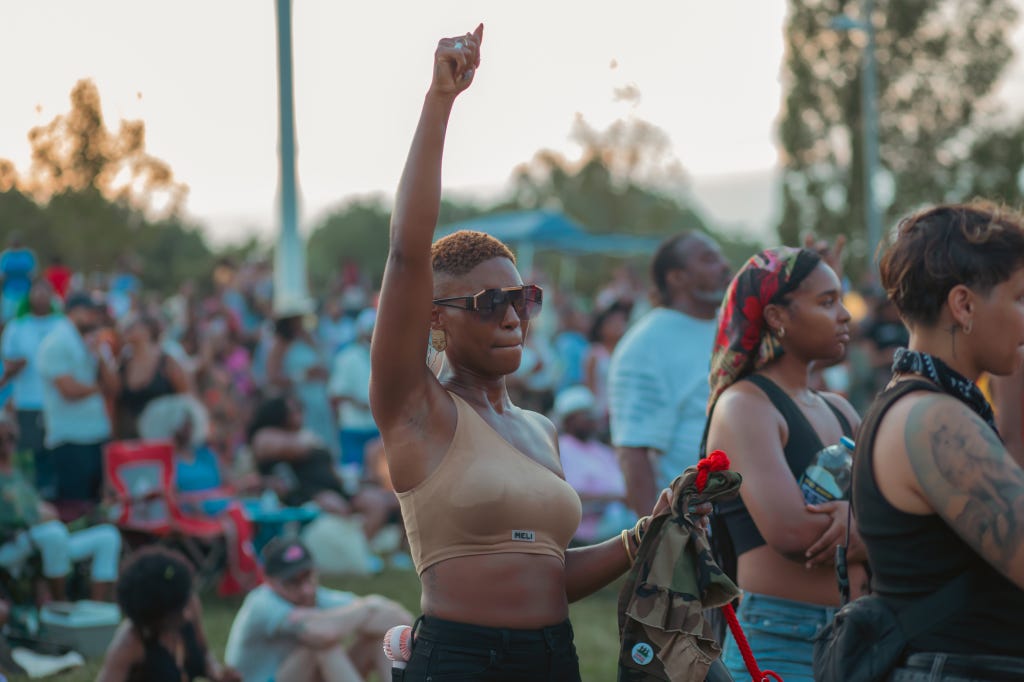

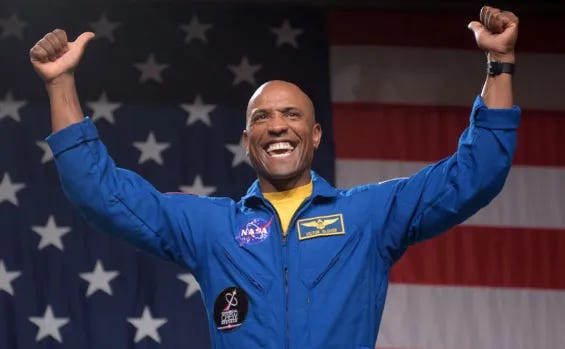
Here’s my copy of a Letter to the Editor of the WaPo regarding your comments on Building the Media Army”
The irony of this Letter to the Editor is not lost. This letter is in immediate support and recognition of Xavier Plisset’s comments on the WaPo piece, “How Democrats are building a media Army”. When I sat to write this I first asked the internet what the Editor of a large daily actually does. The text included “to ensure the accuracy, coherence …”
To so insult Dr Richardson by using her image and not naming or recognizing her accomplishments and professional standing fails these two requirements. You disrespected her by the use of her image but not her name, you embarrass yourself by not acknowledging her accomplishments. She has great professional standing: you lost a half million readers. She is nearly apolitical because she is a historian first, a passionate American secondly. She does “accuracy and coherence.” You don’t.
To imply Dr. Richardson is part of the Democratic media Army is like complaining about James Joyce “Ulysses” use of run on sentences … comparing Carl Sagan’s “billions and billions’ of stars to Stephen Hawking’s “A Brief History of Time,” or dismissing Isabella Wilkerson’s “Caste” as a Black woman’s complaint about discrimination, or, concluding cancer research is “really complicated” because you read Sidhartha Mukherjee’s “Song of the Cell.”
After having lived a long life, I realize there are two common outcomes to being fed with a silver spoon. One, it can convey great taste, read: Katherine Graham. The other outcome is to gag the s*&^ out of everyone around you, read: Jeff Bezos.
Please share profusely in your writer’s room the closing comments of Mr. Plisset: maybe the half-million of so readers who have cancelled their subscriptions are not just mad at Jeff Bezos bending the knee but because there is better writing, more clear, more accurate, more timely, in other formats.
I really appreciate your updates Xplisset! The ongoing fire hose of news that is important to cover and they hoped missed. We see your valiant efforts in print. IMHO Respectfully, take time for yourself and loved ones too. It's exhausting and a nightmare. I always love the good news you bring too.